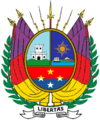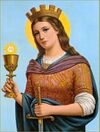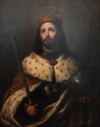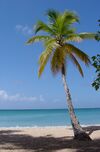National symbols of Gran Verionia
From MicrasWiki
The national symbols of Gran Verionia are the symbols used in Gran Verionia and abroad to represent the nation and its people. The country has a number of national symbols. None of the national symbols of the nation are defined by law but have become part of the national consciousness over the years.
List of symbols
| Symbol | Image | Description |
|---|---|---|
| National Flag |  Flag of Gran Verionia |
The Flag of Gran Verionia was adopted following the Union of 1682. The flag is based on the flag of the Kingdom of Valentia, which also is a horizontal tricolour of purple, red and gold. The flag features the Coat of arms of Gran Verionia in the centre. The colours of the tricolour, purple, red and gold are considered the national colours of Gran Verionia. The purple is the colour of royalty and tradition, and represents the heritage of the confederation. Red stands for the war-ridden history of the nation, as well as for determination and victory. Gold stands for wealth, trade and prosperity. |
| Coat of Arms |  Coat of arms of Gran Verionia |
The coat of arms of Gran Verionia was adopted following the Unification of 1682 and was designed by José Miguél de Veneto. The purpose of the design was to combine elements of the independent nations that were to form the Confederated States of Gran Verionia. The coat of arms consists on an oval shield divided into three parts. The upper left quarter depicts a white castle on a hill, representing the constituent state of Kasterburg, as well as the protection and strength. The upper right quarter depicts a ship, sailing along the coast of South-East Keltia, under the star of Verion. It represents the unification of the Keltian lands under Elu Miqah, as well as the mercantile and endeavouring Verionist spirit. The lower part features the flag of Los Liberados, with the Estrellas de la Libertad. The shield is supported by the purple-red-golden banner of the Kingdom of Valentia, as well as a laurel wreath, which represents victory and virtue. The shield rests on a banner that features the motto. |
| National Anthem | Listen to the Verion Hymn "[[Verion Hymn] |
The Verion Hymn in a piece of music closely related to the House of Verion. The Hymn tells the story of Elu Verion, the mythical founder of the House of Verion. Its origins are unknown, but the song is older than the 14th century AN, and probably dates from the time of the Elfinshi rebellions against the southern Elwynnese invaders. |
| Motto | Libertas (Liberty) |
Stemming from Verionist tradition, the concept of liberty is crucial to the Verionian citizens. The national doctrine of "strong government, free people" can be considered the backbone of Verionian government and politics. |
| National language | Martino | The most widely spoken language of Gran Verionia is Martino. In addition, the confederation has three official regional languages: Toroshi, Soufi and Batavian. |
| Saints |  Santa Regina |
The, likely mythical, figure of Santa Regina is the legendary founder of the Black Temple. According to syncretic Catologian and Path of the Star hagiography, Santa Regina arrived on Valarion in the 16th century to bring the truth. Here, she founded the temple "dedicated to the one true god incarnated in his avatars". |
 San Miguel |
Immediately following his death in 1682, the first head of state of Gran Verionia, Miqah Verion, was canonised as San Miguel. He is credited with uniting the nation and bringing the diverse people of Verionia together. | |
| National tree |  Palm Tree | |
| National animal |  Orycteropus Giganticus |
The Orycteropus Giganticus (commonly named Oryc) is a large burrowing, nocturnal mammal native to South-East Keltia. The creature has a long pig-like snout, which is used to sniff out food. It roams over plains and deserts, avoiding areas that are mainly rocky. The Oryc creates burrows in the sand, and feeds on small creatures such as termites, worms and small lizards. It is also known to eat small birds. |
| National sport |  Football | |
| National liquor | Red Wine | |
| National dish | Ceviche |
| ||||||||||||||||||||||||||